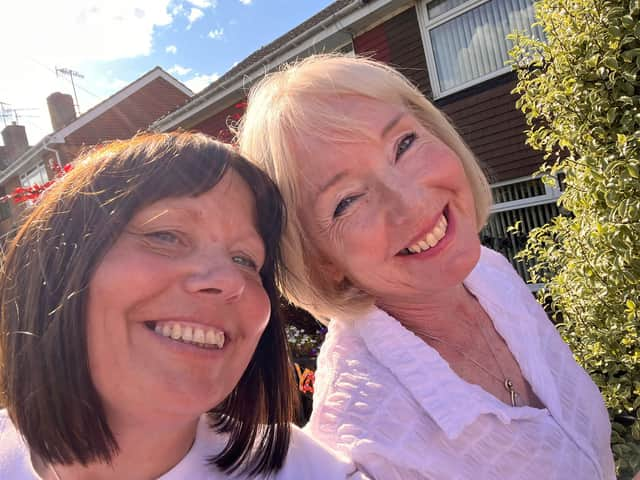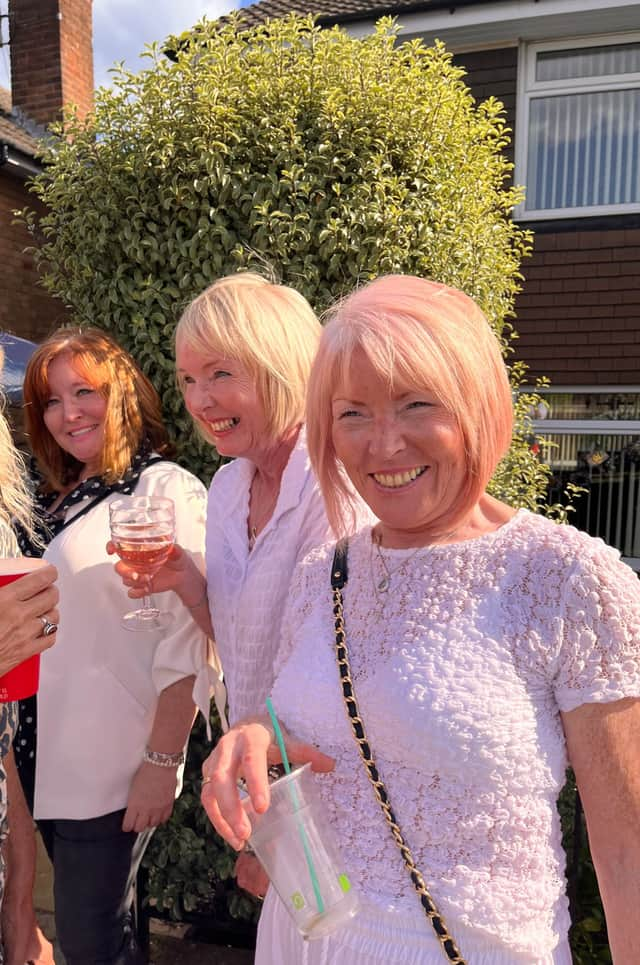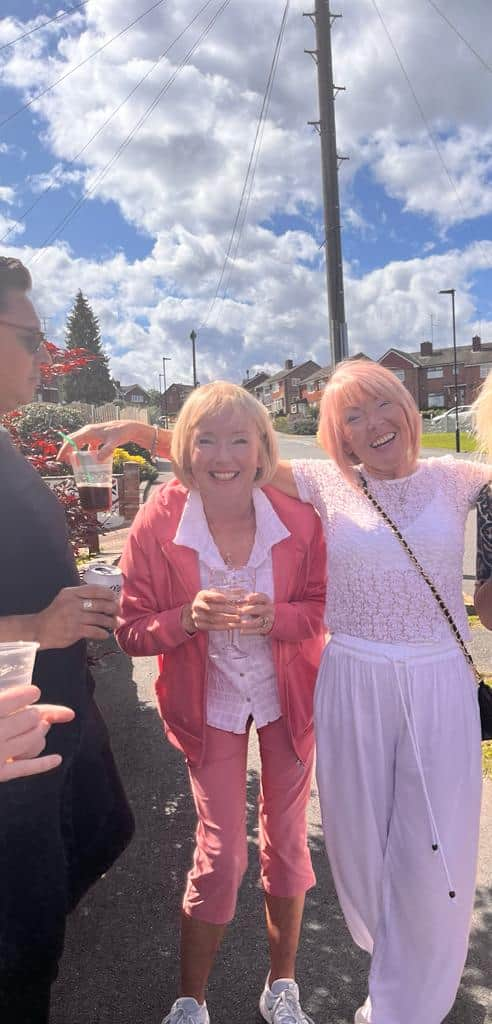“Your breasts could be a ticking time bomb”: Sheffield family of cancer survivors urge people to get checked
Three Sheffield sisters and their niece, who all have a gene fault which causes a higher risk of breast and ovarian cancer, have urged those with a family history of the disease to get their genes tested.
Sam Marsden, aged 50, and her aunties Marian Schofield and Fay Adair, are all breast cancer survivors. They have all had their ovaries removed to prevent other cancers from developing.
Advertisement
Hide AdAdvertisement
Hide AdSam was diagnosed with breast cancer in September 2018 after finding out she had a fault on the BRCA2 gene. She had five months of chemotherapy and a double mastectomy.


She said: “Cancer runs through the family like a stick of rock. My grandma died from ovarian cancer in 1998. Those tests weren’t around then, so there were no hope for her. It shows how far it has all come.”
In 2016, Sam and Jackie got to the hospital for the gene test and called it off because they ‘didn’t want to know’. Thankfully, they both changed their minds, and re-booked the test the following year.
Jackie Callaghan, 69, Sam’s mum and the third sister, had preventative surgery when she found out about the faulty gene and has avoided a cancer diagnosis.


Advertisement
Hide AdAdvertisement
Hide Ad“If my mum hadn’t gone for that test, and I hadn’t, I wouldn’t be here today. It makes your blood go cold thinking about it. It could have been a very different story if we hadn’t taken those tests,” Sam added.
“We are all still here though, to encourage others to get tested, tell our stories and enjoy our lives.”
The women are three of an estimated 99,500 lives saved from cancer in Yorkshire alone since the 1980s, thanks to advances in cancer prevention, diagnosis and treatment, according to new data from Cancer Research UK.
Fay, 59, the youngest of the sisters, was the first to be diagnosed with breast cancer following a routine mammogram in 2016.
Advertisement
Hide AdAdvertisement
Hide Ad“All I heard the doctor say was ‘carcinoma’. I didn’t hear a single word other than that, I could just see their mouths moving. I had the [mastectomy] operation and then chemo, it was horrible. I was so ill that Jackie didn’t recognise me when she saw me in town.


“I was about to have the first operation just as my niece, Sam, got diagnosed. Sam just got through her chemo, and then Marian got it. You just go with it at the time and it's only after that you think, ‘did we really do that?’, and we did.
“Make sure you get checked. You can prevent it from happening and not have to go through the same line as me and my family. Marian didn't need to go through so much of it because she caught it early.”
After finding out Fay had the gene, middle sister Marian got tested right away and was offered a mastectomy. Initially, she decided to just keep attending the routine mammograms.
Advertisement
Hide AdAdvertisement
Hide AdMarian said: “I decided to get a mastectomy too ultimately, but in November 2018, before that, I found a lump. I was referred straight away, and just knew it would be breast cancer.
“In 2019, after the mastectomy, I went back to the doctors and got the lovely news that I didn't have to have any further treatment. That was a real relief after seeing what Fay and Sam had gone through with the chemo.
“I went up to see Fay while she was having hers, and she was so poorly. It was harrowing. She was struggling to breath and had no hair, and I thought, I hope it doesn’t happen to me. The most relief I have felt in my life when I heard I didn’t have to have further treatment.”
Now, the three sisters and Sam are all cleared from cancer, and not letting their history hold them back. Fay and Sam opened the Cancer Research UK superstore in Meadowhall Retail Park last week, and Marian is now volunteering there.
Advertisement
Hide AdAdvertisement
Hide AdMarian said: “Everyone is behind CRUK, because everyone is touched by this terrible disease. Everyone you speak to knows someone who has it. Whatever anyone can do to raise money is just amazing. We as a family are behind them, of course.”
Fay’s 22-year-old son, despite testing positive for the BRCA2 gene, will be able to have children if he decides to without passing on the gene, thanks to advances in genetic treatments.
Sam’s daughter, who is just 15, will be tested for the risk gene when she is an adult. She has already said she will have her breasts removed if she has inherited it, after seeing her mum and Fay so unwell from chemo.
Cancer Research UK’s spokesperson for Yorkshire, Nicki Embleton, said: “The fact that so many lives have been saved in the region over the last 40 years is testament to the power of research and, as a result, a huge number of people have been able to reach milestones in their life they didn’t think they’d see.
Advertisement
Hide AdAdvertisement
Hide Ad“Thanks to the generosity and commitment of our supporters, we’ve played a key role in this progress. Together, we are beating cancer - our research breakthroughs mean every day, people are being diagnosed earlier, have access to kinder and more effective treatments, and some cancers are prevented completely."
The NHS advises anyone who has a family history of cancer to speak to their GP. Patients may be referred to a local genetics service for a test, which can tell you if you have inherited one of the cancer risk genes.
Dame Cally Palmer, NHS national cancer director, said: “NHS teams across the country are making huge progress in the early detection and treatment of cancer and in saving more lives.
“This fantastic progress has been driven by a whole community effort, from more people coming forward, to the impact of awareness campaigns, our brilliant research teams and close collaboration between NHS and cancer charity colleagues – together we can continue to transform the experience and outcome for everyone affected by cancer.
Advertisement
Hide AdAdvertisement
Hide Ad“The NHS has been seeing and treating record numbers of people for cancer, with survival rates now at an all-time high, but it’s vital that people continue to forward. Please get checked out if you have any worrying signs or symptoms – it could save your life.”
Comment Guidelines
National World encourages reader discussion on our stories. User feedback, insights and back-and-forth exchanges add a rich layer of context to reporting. Please review our Community Guidelines before commenting.